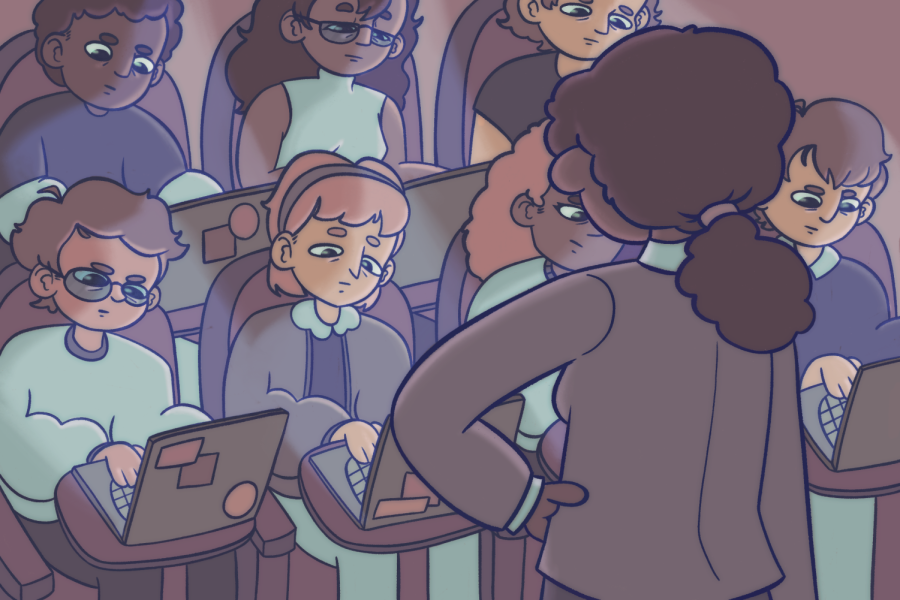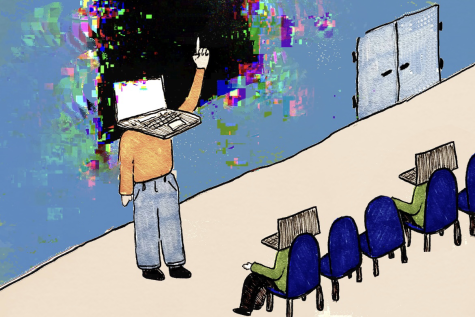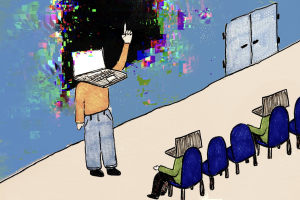Closing laptops opens minds
March 1, 2023
Tears beaded in the corners of my professor’s eyes as she explained how breast cancer affects the human body. She urged us to treat the biology unit as a life lesson, not merely a task to complete. When I heard one of my classmates murmur, I mistook the sound of approval as sympathy for the teacher’s sincerity. Then, I noticed that the student was only responding to a text message on her laptop.
Using laptops during class — unless necessitated by certain accommodations or mandated for specific subjects — detracts from learning. Students should consider limiting laptop usage to better enjoy and engage in learning.
Undeclared freshman Gabby Mauldin said that even when she tries to concentrate in her courses, the flickering activities on her laptop screen proves distracting.
“I think it’s the novelty, or maybe our short attention spans, but it’s completely distracting when people in front of me are doing something that they’re not supposed to be doing on their laptops,” Mauldin said. “Even if I’m dead set on paying attention, it’s hard to turn the distraction off, and it’s not fair to people around you.”
Classroom discussions magnify the problem of open laptops. Though students often don’t intend to be rude, they become absorbed in their screens. For example, students peruse Amazon during sensitive conversations about race and religion — causing some to ignore the vulnerability and wisdom of their peers.
In effect, exploring the internet or blazing through other homework assignments during lectures tells professors: “I don’t care about what you’re teaching.”
Education is a path that reveals new scenery and stretches one’s academic legs. Or, it can be like sprinting, head down, to the finish line. By closing laptops and offering their full reception to a lecture or class discussion, students can look up and open their minds.
Even if students can get good grades in a class without paying attention, tuning out lectures numbs the educational experience. Engaging with education introduces students to new ideas, passions and perspectives.
“You can never overdo it when it comes to paying attention in class,” Mauldin said. “You can never overdo it when it comes to learning. You can never learn everything; you can never master everything perfectly.”
However, outright prohibiting laptops raises issues. Students commonly use them to take notes. Sometimes, online PDFs can even replace expensive, hard copy books.
Environmental engineering sophomore Sophie Snapp said that students should be allowed to use their preferred method to learn.
“Professors should try to make learning as accessible as possible to their students. One of the ways professors can do that is if they allow their students to process that information in whatever way works best for them,” Snapp said.
But using laptops can actually hinder the learning process. Studies show that multitasking while learning severely impairs students’ abilities to recall content. In contrast, handwriting notes causes students to process material more deeply.
Assistant professor of instruction Lewis Fallis said he does not allow students to use laptops in class for this reason.
“It’s not a matter of passively transcribing every word that the professor says in the lecture, but actively distilling the information,” Fallis said.
Instead of trying to double-date education and the internet, students should give their full attention to the ideas and work of their professor and peers. Limiting the use of laptops in classrooms allows students to engage more with course material.
Tompkins is a Plan II and English freshman from Dallas, Texas.












